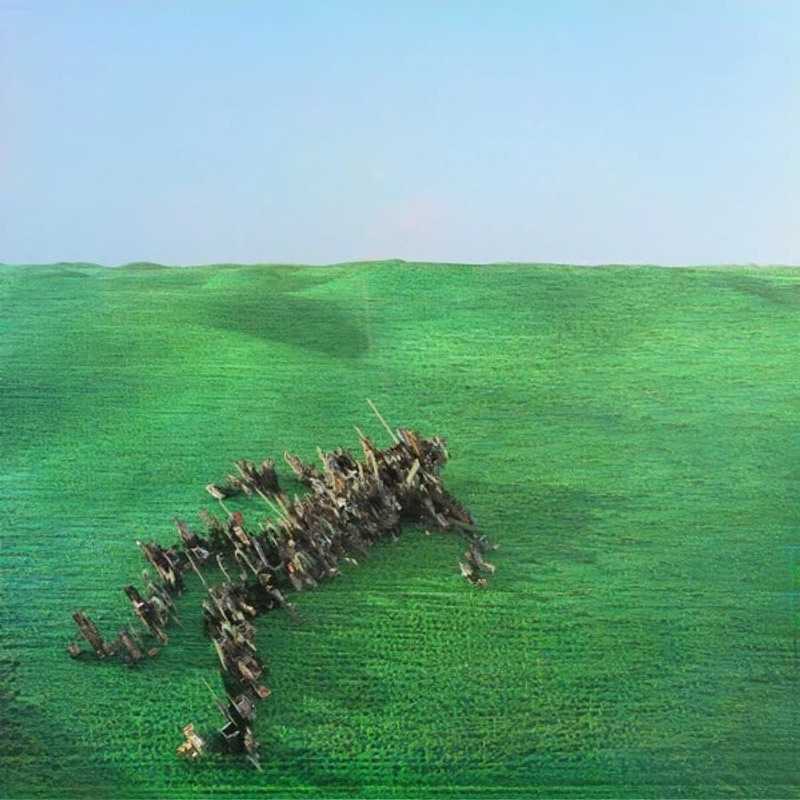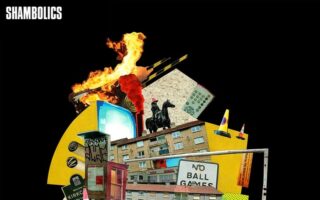
Nobody’s asking for sympathy here, but a quick pan of some of the other pieces about Bright Green Field reveal a common problem.
At one level it’s quite easy to describe, lending itself comfortably to the sort of dense, metaphor-heavy appraisals which feel a bit like critical onanism, but what’s equally true is that you have to be an accomplice, a significant other, at its table, because without that there’s simply no way to embrace it in a meaningful way.
Nearly always experimental and in places chaotic, Squid have made a record with which it’s impossible to have a casual relationship.
Easy options on this evidence were left to a pyre. The quintet – Ollie Judge, Anton Pearson, Louis Borlase, Arthur Leadbetter and Laurie Nankivell – have through earlier material earned the sort of streaming numbers many other bands would trade places for, but flying in the face of that, their debut album – with material which coalesced pre and during lockdown – is a near suffocating maze of jammed cutups, furious post rock and abstract thoughts both cohesive and random.
This means that through no door are things more accessible than any other, but for those starting at the beginning, the brief mechanical clanking of opener Resolution Square is at least an anchor.
It’s followed by G.S.K, a track influenced by J.G. Ballard’s post-societal novel Concrete Island and that musically tries with alienated sounding horns to seduce brutalist minds with organic dreams.
One of the album’s prominent features is its heavily expressionist lack of centricity, the audio equivalent of a leaf in a hurricane. Several tunes wind on to over six minutes, but the longest is Narrator, jagging back and forth, at one peak symphonic, at another through a screaming, vital, only-just-keeping-your-shit together brush with the thin membrane between sanity and madness.
Even that at times feels like no meaningful boundary. There are some tangential, easy to reach for comparators – krautrock, David Byrne, Slint (although they sound nothing like Slint) – but these are as much influences as breaths of condensation on a pane of glass.
Equally, the constant ‘where next?’ has great kinetic energy, as halfway through Boy Racers, after a few minutes of relative normality, everything narrows down to a previously unhinted at drone that was partially created using a sampled medieval instrument. For those who need structure though, there are few solid objects which take any weight.
For all the avant-bricolage, there are genuinely very few passages that will mean nothing apart from to their creators, chief of which is the claustrophobic, spoken word finale to Global Groove.
Not exactly at the end of any other sort of scale, but closer Pamphlet – about the enervating effect of far-right propaganda and middle Britain’s ever growing obsession with its symbols of empire – ferments relentlessly, while Paddling’s anxious treatment of consumerism is ready for a sort of wonky dancefloor with closed, staring eyes for company.
It’s easy in some ways to see Bright Green Field as what happens when a bunch of musicians decide to succumb to impulsivity; an anarchic, but over-indulgent snapshot. Parsed, it’s something different.
Squid are people without a message to endorse, be it hedonism or pessimism. Their music swings backwards and forwards, intricate, complex, detailed, but utterly sincere and in places achieving a rarely found balance between meaning and entertainment. It’s a hard record to write about, but that really is nobody’s problem.
Better still to listen to it and leave answers for later.



